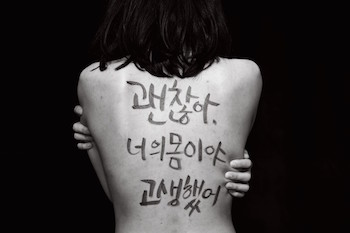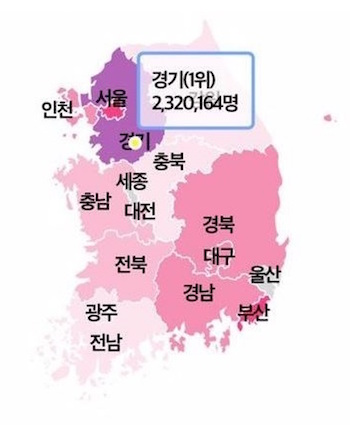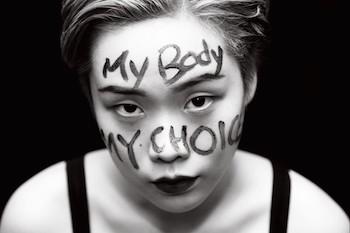Destigmatizing Reproductive Rights

On March 8, the International Women’s Day, the Education Office of Seoul issued a guideline to all schools in the city on ways to ensure female students the right to choose uniform pants and to eradicate general sexism in school. In the US, women could not wear pants on the Senate Floor until 1993.
“We have dress codes that are aimed to control girls’ bodies,” said Zoe Maisel, a senior attending Cornell University. “In my high school, a rule stated that you can’t have your bra strap showing. The only reason why you’re uncomfortable with that is because you sexualize somebody else’s body when they aren’t consenting to it.”
Women have long fought against restrictions intruding the autonomy of an individual’s body. In Korea, abortion was punishable by Criminal Law since 1953 whereas sexual harassment became punishable by Civil Law only since 1999.
In this issue, Ewha Voice delves into national and overseas feminist movements aspiring for liberation on each individual’s body
Destigmatizing Reproductive Rights
Womenlink
“I get asked ‘are you pro abortion?’ a lot. I’d answer ‘I’m simply demanding decriminalization of abortion.’ ‘So you’re pro, right?’ Korean society can’t seem to escape from viewing the issue dichotomously which makes them think feminist organizations enjoy abortion.”
Hong Yeon-ji explained the difficulties of breaking the stigma people have on reproductive rights. She is an activist in Womenlink, a Korean feminist organization established in 1987.
Abortion is currently banned under Clause 269 of Criminal Law in Korea. Since July, Womenlink initiated Photo Project Battle Ground 269 to gather 269 photos of women with written messages on their bodies calling out for reproductive rights.
“Our initial plan was to shoot 100 photos with the photographer Hye-young and receive 169 photos online via #Battleground269 until September,” Hong said. “Thanks to many participants, more than 269 photos have been gathered. We now plan to promote this project internationally so feminists overseas too can send in their photos.”
Black Protest on October of 2016 was the largest protest to demand the decriminalization of abortion. Ministry of Health and Welfare had announced on September of 2016 to intensify its punishment while Ministry of Government Administration and Home Affairs created a demography map of fertile women on December, both as part of a solution to raise fertility rate in Korea.
“It’s interesting how government is so tangibly moving against women’s rights which is in fact, encouraging previously uninterested people to join our fight,” Hong said. “There were people telling us that demography of fertile women was the reason that motivated them enough to participate in the photo project.”
On Sept. 28, the Global Day of Action for Access to Safe and Legal Abortion, feminist groups including Womenlink gathered at Gwanghwamun Plaza to voice out against the laws threatening women’s health and reproductive rights. The participants wore white t-shirts that had specific dates written on them.
“The year, month, and day each represents a personally significant date relevant to one’s reproductive rights,” Hong said. “For example, the day she underwent abortion and the day someone pressured her into having abortion because she kept giving birth to girls.”
Due to the fact that abortion is prohibited by law, schools cannot teach the appropriate actions women should take when faced with unwanted pregnancy. Instead, the sex education standard guideline that the Ministry of Education proposed heavily focuses on abstinence.
“Contraception and sex education taught in schools are just a mess and the rate of teens using birth control is very low,” Hong said. “Women are thus forced to rely on false information or pseudo-medicine. Many have come in to ask us for advice due to unexpected side-effects caused from unsafe abortion.”
Among the contents of the guideline presented by the government reads “girls are weak to mood and guys are weak to nude.” Hong went on to explain how Clause 269 works as a leverage for men who seek revenge rather than a way to discourage abortion.
“Ex-boyfriends and ex-husbands on trial would bring this issue up as if it’s their hidden card,” Hong said. “They even charge women’s parents because encouraging abortion is also punishable.”
Hong emphasized the complexity of reproductive rights in Korea under historical context. When the population surged after the Korean War, the government had set up Family Planning Project to discourage people from having children. Abortion Bus was run by the state to pressure women and force the disabled and the leper into undergoing abortion.
“In Korea, we have to demand the rights for abortion and the rights to not have abortion at the same time,” she pointed out the irony. “Abortion is legal when the mother is disabled – not the fetus, but the mother. Most people don’t mention the sanctity of life then. At a country where the value of life is ranked so starkly, we neither have the right to have, nor not have kids.”
Despite the discouraging history, Hong is hopeful that change may come sooner than expected. “What truly brings change is the people’s change in perception.”
Planned Parenthood Generation Action (PPGA) at Cornell
In the US, the Supreme Court ruling legalized abortion in 1973. Nearly 20 years have passed, yet, there are many who still do not have access to safe and affordable abortion. Planned Parenthood provides healthcare system for marginalized communities via safe, accessible abortion, support groups for LGBT, hormone therapy for transgender patients, education on contraception and reproductive issues, and more.
“Planned Parenthood is one of the most prominent reproductive healthcare for communities of lowincome, color, immigrant, and all the other vulnerable groups that often don’t have access to healthcare,” said Alanna Salwen, the Public Relation Chair for PPGA.
While its healthcare services are mostly funded by the US federal government, abortion remains an exception.
“Some people think the people who support Planned Parenthood are proabortion rather than pro-choice,” said Sabrina Sugano, the Outreach Chair of PPGA at Cornell. “It’s not that we want people to have more abortions, or even want people to have abortions at all. We just want people to have the choice.”
PPGA brings such principles and education to college campuses. At Cornell, its function include political actions to expand reproductive and health access and educating peers on campus.
The members hold various campaigns every semester to spread information about reproductive resources, such as sessions on birth control, campaigns on reproductive rights for people in prisons, and “know your body campaign,” which focused on students’ day-to-day personal issues. Another popular event that PPGA hosts is “sextival,” a term combined of the words: sex and festival.
“One of the things we do in the sextival, is to have a table where we make roses out of condom packets,” explained Zoe Maisel, the president of PPGA. “For some people, it’s their first time seeing or touching a condom packet. We want to destigmatize the whole conversation regarding condoms, make it fun for people to play with red condoms, green condoms, put them into a flower, and they can give it to their friends.”
The members emphasized the necessity of being part of a community like PPGA and their roles.
“Whatever marginalized identities or different backgrounds we may come from, we can admit that we’re all in a huge position of privilege by being here receiving this education,” Sugano said. “We have to both take advantage of that by educating ourselves and honor the responsibility of educating others.”



